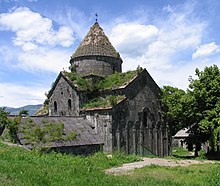Khosrovanuysh
Khosrovanuysh (Armenian: Խոսրովանույշ) was a fifth queen of Bagratid Armenia, and wife of Armenian king Ashot III.
| Khosrovanuysh | |
|---|---|
| Born | Unknown |
| Died | 977 |
| Spouse | Ashot III |
| Issue | Smbat II Gagik I Kiurike I Hripsime |
| Dynasty | Bagratuni |
Biography
[edit]
Queen Khosrovanuysh was a great philanthropist in medieval Armenia. It is known also that her daughter Hripsime became a nun.[1] There is little information about the queen's ancestors and lineage, also unknown when she was born, but the names of her children and grandchildren have been preserved. He had 3 sons: Smbat, Gagik and Gurgen. Smbat inherited his father's throne and became the Armenian king (977-990), who was succeeded by Gagik (990-1020). Gurgen founded a separate royal branch in Lori (Kiurikian) and became first king of Kingdom of Tashir-Dzoraget.[2]
Khosrovanuysh with the help of her husband King Ashot III Bagratuni began in 966 the construction of the Church of the Savior which she dedicated to her sons Smbat and Gurgen who are shown on a bas relief of the tympanum.[3] In the 14th year of Ashot III reign, in 966, Queen Khosrovanuysh built the Sanahin Monastery,[4][5]and then, in 976, the Haghpatavank.[6][7][8] They became scientific and educational centers in the Middle Ages, a university and a library were opened in Sanahin. The Cathedral of Surb Nshan (Holy sign) also was bulit around 967-976 by queen.[9][10]
References
[edit]- ^ Khachʻatryan, Hayk; Merguerian, Barbara J. (2001). Queens of the Armenians: 150 Biographies Based on History and Legend. Amaras. p. 72. ISBN 978-0-9648787-2-3.
- ^ Hovannisian, Richard G. (1997). The Armenian people from ancient to modern times. Internet Archive. New York : St. Martin's Press. ISBN 978-0-312-10169-5.
- ^ Novello, Adriano Alpago (1981). Armenian Architecture: IVth-XVIIIth Centuries. Faculty of Architecture, Milan. p. 27.
- ^ "Monasteries of Haghpat and Sanahin". whc.unesco.org. Retrieved 2024-11-03.
- ^ Adalian, Rouben Paul (2010-05-13). Historical Dictionary of Armenia. Scarecrow Press. ISBN 978-0-8108-7450-3.
- ^ "Armenian encyclopedia, Ashot III" (in Armenian). 2015-05-15. Archived from the original on 2015-05-15.
- ^ Haghbat, p. 534-535, in "Armenian Art", Donabedian, Patrick; Thierry, Jean-Michel. New York: 1989, Harry N. Abrams, Inc. ISBN 978-0810906259.
- ^ Хачикян, Армен (2004). История Армении: краткий очерк (in Russian). Изд-во. "Филин". p. 57.
- ^ Maranci, Christina (2018-09-14). The Art of Armenia: An Introduction. Oxford University Press. ISBN 978-0-19-093588-7.
- ^ Մնացականյան, Ստեփան Խաչատուրի; Հովհաննիսյան, Կոնստանդին Լեվոնի; Sahinyan, Alekʻsandr Arami (1978). Очерки по истории архитектуры древней и средневековой Армении (in Russian). Изд-во АН Армянской ССР. p. 144.
